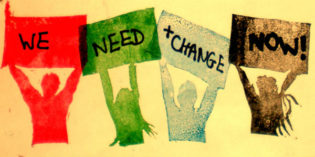Book reviews

Book Review | Women & Power: A Manifesto by Mary Beard
On 6 February 1918, the Representation of the Peoples’ Act gave all men over the age of 21 and some women over the age of 30 the vote in national elections in the UK. Yet, notwithstanding this moment of considerable progress, women remain underrepresented in the seats of power. In Women and Power: A Manifesto, Mary Beard explores this continued exclusion as a consequence of women’s fraught relations with the act of public speaking. This is a timely, witty and impatient examination of the damaging ways that our societies perpetuate women’s silence and is required reading for those who see the fight for gender equality as over, finds Samantha Fu.

Book Review | Why I’m No Longer Talking to White People about Race by Reni Eddo-Lodge
When was the last time you heard a person of colour challenge structural racism – the role of government policies, organisational practices and popular representations in reinforcing racial inequalities – and, in so doing, be widely supported, listened to and heeded? Racial inequalities are stark, yet normalised. White people are privileged yet complacent, and refuse to listen. In her phenomenally brilliant new book, Why I’m No Longer Talking to White People about Race, Reni Eddo-Lodge catalyses an urgent conversation about race in Britain, writes Alice Evans.

Book Review | Miseducation: Inequality, Education and the Working Classes by Diane Reay
In Miseducation: Inequality, Education and the Working Classes, Diane Reay draws on interviews with over 500 children to explore the class inequalities that persist in UK education today from the transition to secondary school up to university. The book’s personalisation of everyday working-class experiences of education, combined with statistical evidence on continued inequality, makes this engaging and timely reading, finds Natasha Codiroli Mcmaster.

Book Review | A Brief History of Feminism by Antje Schrupp, illustrated by Patu
With A Brief History of Feminism, Antje Schrupp and illustrator Patu have crafted a graphic novel that traces the development of feminism from antiquity to the present day. While the book is primarily limited to offering an account of the evolution of European, Western feminist movements, this is nonetheless a fun, accessible and educational read that will give readers a thirst to learn more, finds Sonia J. Wieser.

Book Review | Youth Movements and Elections in Eastern Europe by Olena Nikolayenko
In Youth Movements and Elections in Eastern Europe, Olena Nikolayenko examines the role played by youth activists in mobilising citizens prior to elections against incumbent repressive regimes in post-communist Europe, focusing on Serbia, Belarus, Georgia, Ukraine and Azerbaijan in the early 2000s. Drawing on interviews, government sources, NGOs and media reports, this book offers important insight into the impact of youth movements upon democratisation processes, as well as the challenges they face, writes Anna Nadibaidze.

Book Review | A Research Agenda for Neoliberalism by Kean Birch
In A Research Agenda for Neoliberalism, Kean Birch seeks to bring clarity to the ubiquitous use of ‘neoliberalism’ as a term in academic and popular discourse, looking at how analysts from across the political spectrum have understood this concept. The book does a valuable job of establishing the contours of existing discussions of neoliberalism, finds Christopher May, and would be an excellent resource for readers within and beyond the academy.

Book Review | Orbán: Europe’s New Strongman by Paul Lendvai
In Orbán: Europe’s New Strongman, Paul Lendvai examines how, via a ‘lightning-speed assault’ on its democratic features, Hungary can now be better characterised as an authoritarian system under the rule of Viktor Orbán. Exploring such topics as the deterioration of the country’s rule of law, the end of the separation of powers and mass clientelism, Lendvai succeeds in tracing Hungary’s rapid slide towards authoritarianism in this excellent book, writes Paul Caruana-Galizia.

Book Review | Assembly by Michael Hardt and Antonio Negri
Why is it that so many revolutions and other social movements have seemingly failed to bring their emancipatory ideals into being? In response to this enduring question, Michael Hardt and Antonio Negri offer Assembly, which inverts the traditional division of revolutionary labour to give strategic force to the assembly of the multitude. While the book aims to offer a blueprint for forms of collective organisation that can bring about a more democratic and just society, Joshua Smeltzer is unconvinced that the authors’ hollowing out of the traditional sphere of the political can deliver this social alternative.

Book Review | The Borders of ‘Europe’: Autonomy of Migration, Tactics of Bordering edited by Nicholas De Genova
The collection The Borders of ‘Europe’: Autonomy of Migration, Tactics of Bordering, edited by Nicholas De Genova, offers a compelling in-depth analysis of immigration to Europe through contributions that repeatedly go to the heart of contemporary policy conundrums. Suggesting ways in which scholar-activists can make a potential difference, this book offers a thorough education in the implications of Europe’s evolving, unwieldy border apparatus upon the lives of migrants and Europeans, recommends Paul Clewett.



 Democratic Audit's core funding is provided by the Joseph Rowntree Charitable Trust. Additional funding is provided by the London School of Economics.
Democratic Audit's core funding is provided by the Joseph Rowntree Charitable Trust. Additional funding is provided by the London School of Economics.